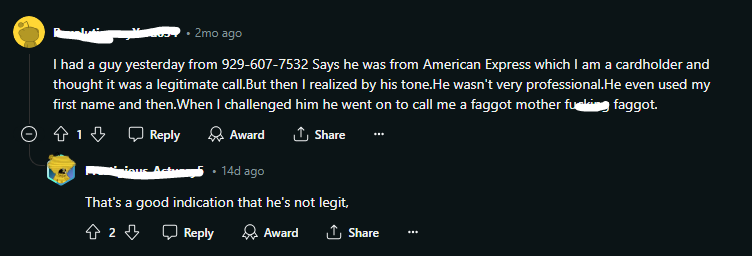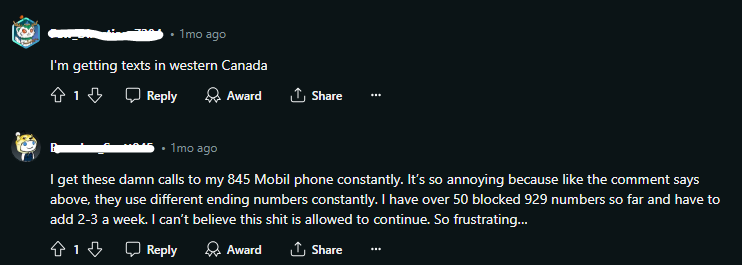Table of Content
- Where Does the 929 Area Code Come from?
- Is Area Code 929 a Spam?
- What Kind of Scams Are Reported Using the 929 Area Code?
- Why Do So Many Spam Calls Have the Code 929?
- Why Do Scammers Use Neighbour Spoofing Tactics?
- 8 Ways to Protect Yourself from Area Code 929 Scam
- What are the Most Common Numbers Used By Scammers With a 929 Area Code?
- Frequently Asked Questions (FAQs)
- Fight Back Against 929 Area Code Scams!
Do you ever feel like the number 929 haunts your phone? You answer once, and a robocall promotes extended car warranties.
These constant calls from the 929 area code are more than an inconvenience; they're a scammer's playground!
Let's look at the strategies behind these 929 area code scams and provide you with the knowledge you need to put an end to them.
Where Does the 929 Area Code Come from?
The area code 929 serves New York City, specifically the boroughs of Brooklyn, Queens, the Bronx, and Staten Island, as well as a small section of Manhattan known as Marble Hill.
It was introduced as an overlay area code in 2011 to augment the existing codes 718 and 347, which were running out of accessible phone numbers. This means that all of these areas, which were previously independent, now share the same area code.
Discover if Your Most Critical Identifiers Have Been Exposed on the Dark Web
Receive timely alerts and actionable insights with PurePrivacy's Dark Web Monitoring.
Is Area Code 929 a Spam?
The 929 area code, which serves several significant regions in New York City, has sadly become a hub for fraudulent activity. Scams ranging from identity theft to phishing can be complex and do significant damage.
While the 929 area code is valid and legitimate, it is vital to note that it has been used for various scams, making it even more crucial to break down each category for better knowledge and awareness.
What Kind of Scams Are Reported Using the 929 Area Code?
Many people on the internet have reported receiving insecure calls and text messages from phone numbers in this area code.
Scammers frequently use the 929 area code to carry out their fraudulent activities. These scams can range from attempting to steal someone's identity to getting them to submit sensitive information, such as personal or financial information.
Some usual kinds of scam calls recorded in the 929 area code include:
- Computer Support
Callers claim to be tech support workers offering assistance with computer problems. They may request remote access to your device, hoping to get unwanted access and possibly obtain personal information.
- Fake Rewards
Scammers persuade victims that they have won a prize or gift and then require personal information or payment to receive the alleged reward.
- Fraud Deliveries
Fraudsters use SMS messages regarding unrequested delivery to create a sense of urgency and induce people to click on dangerous links or disclose information.
- Financial Transaction Alerts
Scammers send notifications to victims about fraudulent transactions on their bank or credit card accounts, pushing them to click on links or submit personal information.

- Impersonation
Fraudsters impersonate family, coworkers, or authorities, frequently employ AI to mimic voices, and need immediate cash funding.

Why Do So Many Spam Calls Have the Code 929?
There are a few reasons why you may be receiving a lot of spam calls with the 929 area code:
Availability
Area code 929 is a relatively recent code that serves York City. Scammers can easily obtain a huge number of new phone numbers in a newer area code.
Anonymity
Because it is a New York area code, it can hide the scammer's location and appear real to some recipients.
Bypassing Blocking
Scammers regularly change phone numbers to escape being blocked. They may easily accomplish this using a widely available pool of numbers, such as those with area code 929.
Why Do Scammers Use Neighbour Spoofing Tactics?
Neighbor spoofing is the process of changing a caller ID to reflect a local phone number, which is generally the same area code as the recipient. This can lead to people answering the phone because they believe it is from someone they know or is in their region.
Here's why spoofing may occur with a 929 area code - New York City:
- Scammers use neighbor spoofing to appear real and enhance the likelihood of the call being answered.
- Some organizations use spoofing for telemarketing calls, believing that a local number will get past call blocking.
8 Ways to Protect Yourself from Area Code 929 Scam
With this information, you may take precise, concrete steps to protect yourself from these fraudulent acts.
- Keep Your Personal Information Private
Always avoid exchanging personal or financial information over the phone or text.
- Do Not Call Back Unknown Numbers
An essential guideline is to never call back unknown numbers, especially if the call just lasted a few rings.
- Regularly Check Your Accounts
Regularly reviewing your financial statements might help you identify any improper activities early.
- Two Factor Authentication
Using two-factor authentication provides an additional layer of security for your accounts. It is especially useful for online accounts that store personal information or financial assets.
- Report Suspicious Actions
If you receive a strange call or text, report it to your service provider or the appropriate authorities. You can report such incidents to the Federal Trade Commission (FTC) or call their hotline at 1-888-382-1222. You can forward suspicious SMS to 7726 (SPAM).
- Educate Scam Targeted People
The elderly are frequently targeted in similar schemes. It is critical to educate them on the warning indications and consequences of these misleading activities.
- Register on the Do Not Call List
To stop receiving marketing calls, register with the National Do Not Call List. This can help you distinguish between sales calls and scams: if you continue to get unsolicited contacts after 31 days, you are most likely dealing with scammers.
It should be noted, however, that the List excludes debt collectors as well as political, charity, and surveying groups.
- Keep Your Info Safe with PurePrivacy
PurePrivacy does not let third parties sell your information. This could make you less vulnerable to spam calls or messages that target specific groups through data selling. It also allows you to download secure third-party call-blocking apps while preventing the download of dangerous apps.
What are the Most Common Numbers Used By Scammers With a 929 Area Code?
You can detect potential fraudulent schemes no matter where you are by becoming acquainted with the phone numbers most typically connected with spam from area code 929.
Although scammers may use a variety of numbers to carry out their fraudulent activities, certain numbers appear more frequently than others.
- 929-630-6350
- 929-877-7387
- 929-565-0588
- 929-554-6926
- 929-909-3974
- 929-444-7689
- 929-389-1006
- 929-572-2321
- 929-312-3622
Frequently Asked Questions (FAQs)
-
Why am I receiving spam calls from 929 different numbers?

There are several reasons:
Scammers utilize faked numbers, which let them display any number, including area codes such as 929, on their caller ID.
Your number could be on a spam list: If your phone number was exposed in a data breach or sold on the black market, scammers may target you.
-
How can I recognize a probable scam call from a 929 number?

The caller sounds robotic or delivers a pre-recorded message (robocall).
The caller creates a sense of urgency, urging you to act quickly.
The caller is threatening you with legal action or arrest.
The caller requests sensitive information such as your Social Security number or bank account data.
The offer seems too good to be true (e.g., free vacations, easy money). -
What should I do if I unintentionally answer a scam call?

Don't communicate with the caller. Do not press any buttons, even to disconnect from the call. Scammers utilize button presses to ensure that they have a working phone number.
Hang up immediately.
Report the call to both your phone company and the Federal Trade Commission. -
Can I determine the origin of a 929 spam call?

Unfortunately, consumers find it difficult to trace spam calls. Law enforcement authorities have access to tracing techniques, but they normally focus on large-scale schemes.
Fight Back Against 929 Area Code Scams!
Having the right knowledge and expertise can empower you to fight back.
By taking the actions indicated above, you can protect yourself from these scams.
Report strange calls, use call-blocking applications, and stay current on the latest methods.
Share this knowledge with your sensitive loved ones.
Remember that vigilance is vital.
With these methods, you can prevent scammers from interrupting your phone conversations.






